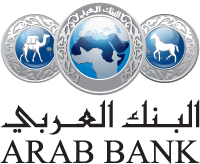Arab Bank
 |
|
|
Native name
|
البنك العربي |
|---|---|
| Public | |
| Traded as | : ARBK |
| Industry | Banking |
| Founded | 1930 |
| Headquarters | Amman, Jordan |
|
Area served
|
30 countries |
|
Key people
|
Sabih Masri (Chairman) |
| Products | Current and saving accounts, Personal loans, Overdraft facility, Home loans, Car loans, Credit cards, Term deposits, Funds transfer, Currency exchange, Investment opportunities, Commercial lending, Project and structured finance, Private banking, Asset management, Brokerage, Money markets, Foreign exchange, Capital markets, Commercial lending, Term financing, Project and structured finance, Corporate finance and capital markets |
|
|
|
| Total assets | US$ 49 billion (2015) |
| Total equity | US$ 8 billion (2015) |
|
Number of employees
|
6,540 (2015) |
| Subsidiaries | Arab Bank (Switzerland) Limited (sister institution), Arab Bank Australia Limited, Europe Arab Bank plc, Islamic International Arab Bank plc, Arab Sudanese Bank, Arab Investment Bank S.A.L., Arab Tunisian Bank, Arab Bank – Syria, Al Arabi Investment Group (AB Invest), Arab National Leasing Company, Al Nisr Al Arabi Insurance Company, Al Arabi Investment Group Company |
| Website | Arabbank.com |
Arab Bank is one of the largest financial institutions in the Middle East, founded in 1930 in Jerusalem, Mandatory Palestine, as the first private sector financial institution in the Arab world. Headquartered today in Amman, Jordan, it serves clients in more than 600 branches spanning five continents. Arab Bank is a publicly held shareholding company listed on the .
The bank is a major economic engine in Jordan and throughout the Middle East and North Africa region, providing banking services and capital, and facilitating development and trade throughout the region. According to its website, the bank is the highest-ranked by market capitalization, and represents 28% of the .
In 2013, Global Investor named Arab Bank the "Best Cash Manager in the Middle East" and distinguished Arab Bank Invest as the "Best Brokerage House in Jordan". Euromoney also honored it as "Best Bank in Jordan" for the sixth consecutive year. In 2013, Arabian Business recognized the bank as Regional Bank of the Year. From 2012 to 2013, Global Finance honored the bank with seven awards including Best Trade Finance Provider in the Middle East, Jordan and Yemen, Best Emerging Market Bank in Jordan and Yemen and Best Foreign Exchange Provider and Best Investment Bank in Jordan. According to its 2010 Sustainability Report, J.P. Morgan honored Arab Bank Switzerland with the Quality Recognition Award for Outstanding Achievement 2009–2010 Best in Class.
In 2000s, several lawsuits were filed against the Arab Bank about its involvement in facilitating the funding of terrorist organizations, all the lawsuits were later appealed by courts and no action was taken against bank.
In the 1940s and 1950s, the bank grew to 43 branches and had JOD 5.5 million capital. During the 1965s period, the bank focused on investments and became a catalyst for Arab economic developments when most other financial institutions avoided the risk.
During the nationalization wave of the 1960s, Arab Bank lost a total of 25 branches. Following the Six Day War in 1967, the bank closed its West Bank and Gaza branches. Although it closed branches in the Middle East, the bank continued to expand in other parts of the world. In 1961, the bank opened its first international location, becoming the first Arab financial institution to establish a presence in Switzerland. By 1964 Arab Bank Switzerland had locations in both Zürich and Geneva.
...
Wikipedia
